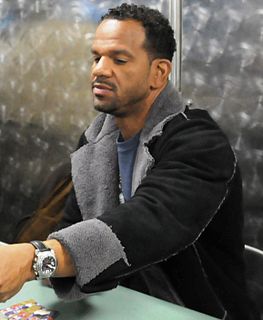A Quote by Trisha Goddard
I'll get into a pattern where I start sleeping only between 12 and 3.30, and go for weeks like that.
Related Quotes
Sleep is all about recovering. So if you're not sleeping, you're not recovering. And if you're going to break your body down a lot, you better find ways to build it back up. And the only way to do that is get a lot of sleep. So for me, I go to bed at like 8:30, 9:00. As soon as I put my kids to bed. Because I'm up at 5:30 the next day.
Now, some people might look at something and let it go by, because they don't recognize the pattern and the significance. It's the sensitivity to pattern recognition that seems to me to be of great importance. It's a matter of being able to find meaning, whether it's positive or negative, in whatever you encounter. It's like a journey. It's like finding the paths that will allow you to go forward, or that path that has a block that tells you to start over again or do something else.
I can only work between the hours of 8:30 and 4:30, because that's when the kids are at school. So I get to do all my work and have all of my fun in that time, which means just sitting on a chair, typing, alternately clicking between writing a column and being on Twitter, and smoking as many cigarettes as I can before my lungs give out.
Most film productions, when they're based at a place, they get, like, a 30-mile radius or a 30-minute radius to get out of the town. And once you go past that, your day starts to become shorter, and you have to start paying your drivers more, and everybody just gets paid more, and you have less time to shoot, and everything costs more.
Realize that sleeping on a futon when you're 30 is not the worst thing. You know what's worse, sleeping in a king bed next to a wife you're not really in love with but for some reason you married, and you got a couple kids, and you got a job you hate. You'll be laying there fantasizing about sleeping on a futon. There's no risk when you go after a dream. There's a tremendous amount to risk to playing it safe.
We're not really sure why it [broken circadian rhythm] continues, but when they become adults, we usually have to treat it because many people need to get up early to go to work and they can't be sleeping until 11:00 or 12:00. So we use treatments like bright light therapy, melatonin, things like that that are very effective.
There are so many things out there now like these 30-minute workouts. I don't know if they work, but a lot of people have jobs and they don't have time to go to the gym. They can do those little 30-minute workouts they see on TV, or get one of those little portable gyms for their house. I think that's a good start.



































